History of Kennisland
Kennisland was founded in 1998. It all started in the Van Eeghenstraat in Amsterdam. We later moved to the chic Astoria building on the Keizersgracht and between 2015 and 2020 we have been working on social progress from Spring House on Amsterdam's river IJ. As of the end of 2020, our office is located at the creative hotspot Marineterrein. In 2022 we merge with CAOP.

Back side of the clock on our office on the Keizersgracht
Maker: Kennisland
DownloadStichting (a foundation under Dutch law) ‘Nederland Kennisland’ (‘Netherlands Knowledge Nation’) was formally established by Frans Nauta in July 1998. In early 1999, he met Joeri van den Steenhoven and Bartjan Jansen. In the early years, the three determined the foundation’s course from their offices on the Van Eeghenstraat in Amsterdam. Jetse Sprey was the driving force behind the scenes. They wanted Kennisland to become a think tank that would empower and accelerate the development of the Netherlands as a knowledge nation (‘kennisland’ in Dutch), in a time when our country threatened to become a distribution nation.
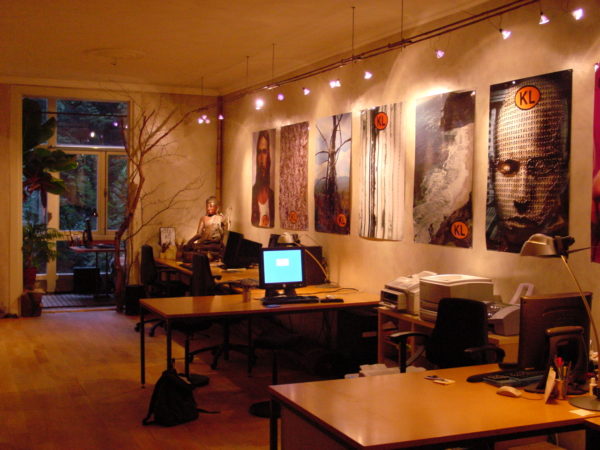
Kennisland's first office on the Van Eeghenstraat in Amsterdam.
Maker: Kennisland
Download
The foundation’s goals were as follows: to develop and spread understanding of the social, economic, political and cultural consequences of knowledge in western society and the resulting opportunities and threats for Dutch society, and to argue for an approach to socioeconomic development in the Netherlands based on knowledge as a source of prosperity and welfare.In the beginning, KL argued for an approach to socioeconomic development in the Netherlands based on knowledge as a source of prosperity and welfare.
The official founding meeting of Nederland Kennisland took place on 2 October 1999 in Felix Meritis in Amsterdam. A network of around 75 interested people selected the first projects that the foundation would work on. In December of the same year, a meeting followed with twenty top figures from government and business (including Origin, Microsoft, KLM and De Baak). The Committee of Recommendation already included many important names.
Projects, projects, projects
The first projects started in the year 2000: Kenniswijk++KenniswijkKenniswijk was a project lasting several years that brought broadband internet to a district of the city of Eindhoven. (Knowledge Neighbourhood) and Digitale Trapvelden++Digital playing fieldsA Digital Playing Field was a space in a neighbourhood experiencing challenges, where everyone had the opportunity to learn about ICT and where activities were set up to improve the lives of people living in the area. (Digital Playing Fields). Support from the Ministry of Transport and Water Management and the Ministry of the Interior and Kingdom Relations gave the foundation’s work a boost. Kennisland’s reputation as a creative club full of young and ambitious talent was thus secured. The real work could then begin.
In a short period of time, KL started an impressive number of projectsIn a short period of time, KL started an impressive number of projects., including Digitale Pioniers++Digital PioneersBetween 2002 and 2010, the Digital Pioneers scheme was one of the most high-profile Kennisland projects. Via the Digital Pioneers scheme, we supported no less than 211 social internet projects with a financial contribution and coaching. (Digital Pioneers), Stedenlink (City Link), Belgen doen het beter (Belgians do it better), Netwerk ff contact (Let’s make contact network), Breedbandproeven (Broadband Trials), Creative Commons++Creative CommonsCreative Commons offers tools to makers of copyright-protected work who want to encourage reuse of their works. These tools allow them to decide the conditions under which their works may be reused. Read more and Creative Capital.
Political lobby
In 2002, Hans Westerhof joined the board and the political lobbying work began in earnest. The next government was under pressure to make a serious effort to develop the knowledge economy. The breakthrough came in 2003 with the publication of our first Knowledge Economy Monitor ‘Time to choose’++Knowledge Economy MonitorThe following Knowledge Economy Monitor, ‘Six breakthroughs in the polder’ followed in 2006, with another in 2010: ‘Beyond disparities in a smarter Netherlands’. (in Dutch only) (in Dutch only). The Netherlands was no longer among the top countries for major investments in education and research. Something had to change.In 2003, The Netherlands was no longer among the top countries for major investments in education and research. Something had to change. Based on the Finnish model, the second Balkenende government++BalkenendeJan Peter Balkenende served as Prime Minister of the Netherlands from 22 July 2002 to 14 October 2010. Read more set up the Innovation Platform, of which Kennisland founder Frans Nauta was the first secretary. The platform represented the Dutch knowledge economy and encouraged innovation and enterprise in the Netherlands.
In the following years, KL grew steadily and began to be taken seriously as a think tank. The topic of the ‘knowledge economy’ was on the political agenda, but what should be done about it in practice? How could we make the Netherlands a smarter country, a knowledge nation? From that point on, Kennisland focused on this question. One of the issues we worked on was how to make government more efficient. In 2006, we set up the Kafka Brigade++Kafka BrigadeThe Kafka Brigade proved to be sorely needed. In 2010, the founders of KL, Jorritdejong.nl and Zenc, decided to turn the foundation into an independent organisation, to make it even more effective. See the website, which sought out and tackled unnecessary and dysfunctional bureaucracy in government.
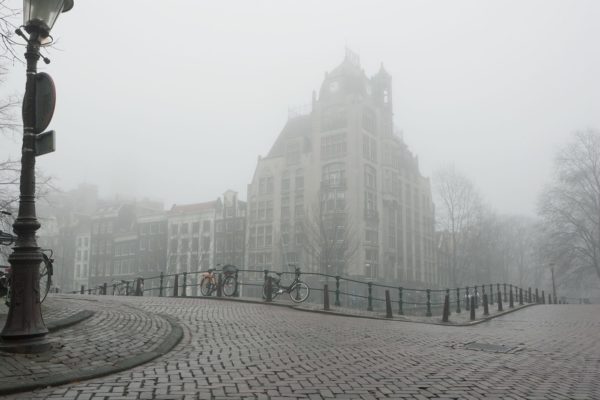
In 2005, KL moved to a beautiful and much larger office on the Keizersgracht, next to the Westertoren. In early 2006, Frans Nauta stepped down as chair and was followed by Joeri van den Steenhoven. The board consisted of Joeri, Syb Groeneveld and Hans Westerhof. By this point, the team was made up of sixteen staff, several freelancers and of course interns.
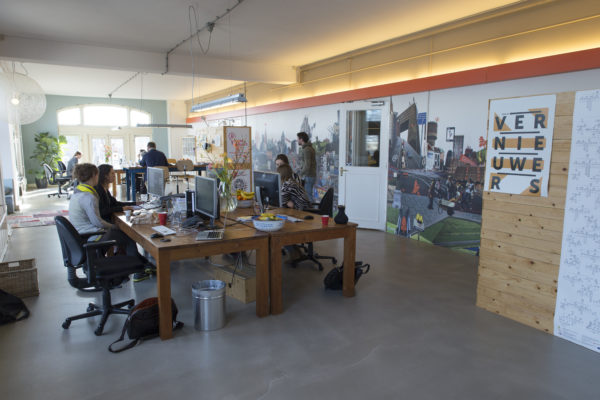
One of six spaces inside our headquarters on the Keizersgracht.
Maker: Kennisland
Download
One of the largest projects ever developed by Kennisland was Beelden voor de Toekomst (Images for the Future). Over a period of seven years, this project saved a major part of the Netherlands’ audio-visual heritage from destruction through conservation and digitisation. Kennisland focused on modernising copyright law and was responsible for knowledge sharing, communication and positioning. At its high point, up to seven KL staff spent several years working on the project.++Images for the FutureThe FES made 115 million Euro available to digitise the Netherlands’ audio-visual heritage. In total, 91,183 hours of video, 22,086 hours of film, 98,734 hours of audio and 2.5 million photos from the archives were restored, conserved, digitised and (in part) made available via services.
Education and social innovation
With the arrival of Chris Sigaloff in 2007, Kennisland increasingly focused on educationIn 2007, Kennisland increasingly focused on education and social innovation., with Onderwijs Pioniers++Education PioneersAfter ten years and a thousand pioneers, in 2015 the initiative won an enduring place in education within the framework of the Teachers’ Development Fund (LOF). (Education Pioneers) as the most high-profile project. It was set up by Chris and Kimon Moerbeek. Chris became a member of the Kennisland board in 2009, joining Joeri van den Steenhoven. Under her leadership, KL focused more on social innovation, a somewhat neglected child in comparison to technological innovation, which is more often the focus of debate. This proved to be a great success, and Kennisland became an important and valued player in the field internationally. Among other things with our social labs++Social labsExperimental spaces for social challenges. The social lab makes complex problems understandable by bringing together the perspectives of citizens, professionals and policy makers, and involves these groups in carrying out research, analysis and in developing problem-solving capacity. Read more in Amsterdam, Vienna, and Nijmegen and with the important role we played in the European Social Innovation Competition.
In 2011, Paul Keller joined the Kennisland board. Later that year, Joeri van den Steenhoven stepped down as chair. Under the leadership of Chris Sigaloff and Paul Keller, KL grew to become an important player in fields such as social innovation, education, copyright law and digital heritage. Through the years, the focus broadened: we moved beyond working on Dutch society to consider the social development of Europe, and even Asia.
Since 2011 the focus broadened: we moved beyond working on Dutch society to consider the social development of Europe, and even Asia.
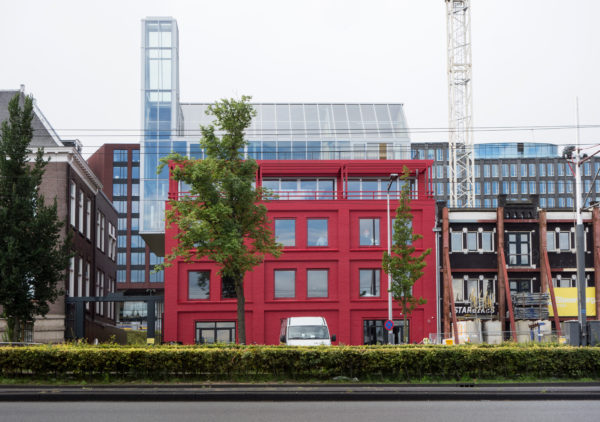
Our HQ at De Ruyterkade 128 in Amsterdam. Manhattan red with a glass roof.
Maker: Kennisland
Download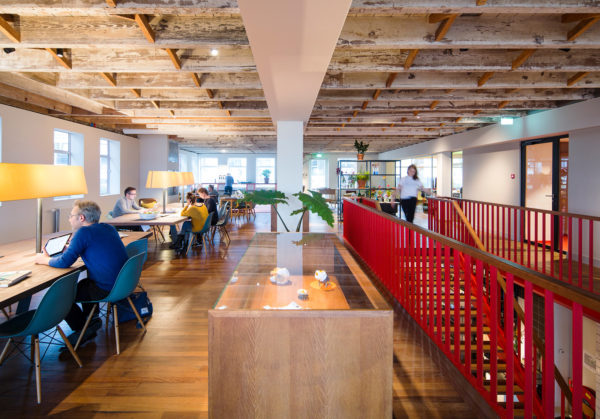
In 2015, Kennisland moved In 2015, Kennisland moved to Spring House, where innovators came together, collaborated and learned from one another based on a deeply-rooted engagement with the world around them.to Spring House++Spring HouseIn 2018, the number of Spring House members grew to more than 200 people., clubhouse for innovators, which we developed together with Vandejong Creative Agency and Joanna van der Zanden. Curious people and organisations who refuse to go with the flow worked here based on the shared conviction that society can become more social and sustainable. This group of creative and cultural entrepreneurs, artists, strategists and researchers all shared the ambition of promoting interaction and collaboration between different disciplines. It was a workplace, lab and platform where innovators came together, collaborated and learned from one another based on a deeply-rooted engagement with the world around them.
Social progress, but for whom?
Halfway through 2017, Chris Sigaloff left Kennisland and Nora van der Linden and Kimon Moerbeek joined the board. Paul Keller left Kennisland in early 2019. With his departure, our copyright and digital heritage activities++Copyright and digital heritageRead in this article what we have done for open access, open content and the modernisation of copyright. came to an end.
In 2020, the social experiment Spring House ended and we temporarily settled in Diemen. At the end of 2020, we moved to the beautiful Marineterrein in the center of Amsterdam, a creative hotspot with all kinds of innovative companies, colleges and universities involved in new technology, climate change, the liveable city and other social issues. Kennisland fits in perfectly being a think tank and do tank for social progress. In the same year Kimon stepped down as director.
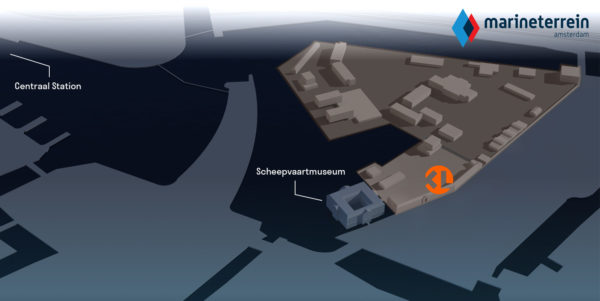
Kennisland was founded to put social innovation and the knowledge society on the map – and we have succeeded. We are increasingly focussing on what innovation delivers and for whom.
Care innovation
Since 2017, Kennisland has also focused on care innovation, to be precise: dignified, inclusive, high-quality, sustainable healthcare. Everyone wants it. However, interests and responsibilities are excessively fragmented, which leads to suboptimal, one-sided solutions. True progress is only possible if we redefine and redesign the playing field. More space must be created for experiment and innovation in healthcare, in response to blinkered compartmentalisation and misguided attempts at social engineering. The demand for healthcare is on the increase, while budgets are shrinking. This is why we wish to involve many more people across society in the search for solutions for better, hopeful healthcare in the Netherlands. We do this, among other things, by researching and improving learning in healthcare. We conducted action research into flexible working in healthcare and set up a development process in which social entrepreneurs jointly innovate informal care. In the long-term pioneering programme Living a Whole Life, we are building an innovative, positive movement around better ageing.
Kennisland joins forces with CAOP
In 2022, an interesting new era begins for Kennisland. We are merging with the CAOP++Merge with CAOPRead more about our considerations and what it means for Kennisland. On January 1, 2023, Sardes also merged with the CAOP. Together, the three brands form Stichting CAOP. Read here what the foundation stands for., a non-profit organisation that works on social problems in education, healthcare and government, just as we do. While we will retain our identity, we will be in a better position to realise our ambitions by joining forces. For example, it will be easier to upscale successful projects and concepts, and take them further thanks to the extensive network, organisational capacity and expertise of CAOP. At the same time, CAOP can benefit from our innovative capacity and creativity.
In January 2023, Nora van der Linden leaves Kennisland after almost twelve years. Marieke van Doorninck takes over from her as director.
Read about where we stand for here

